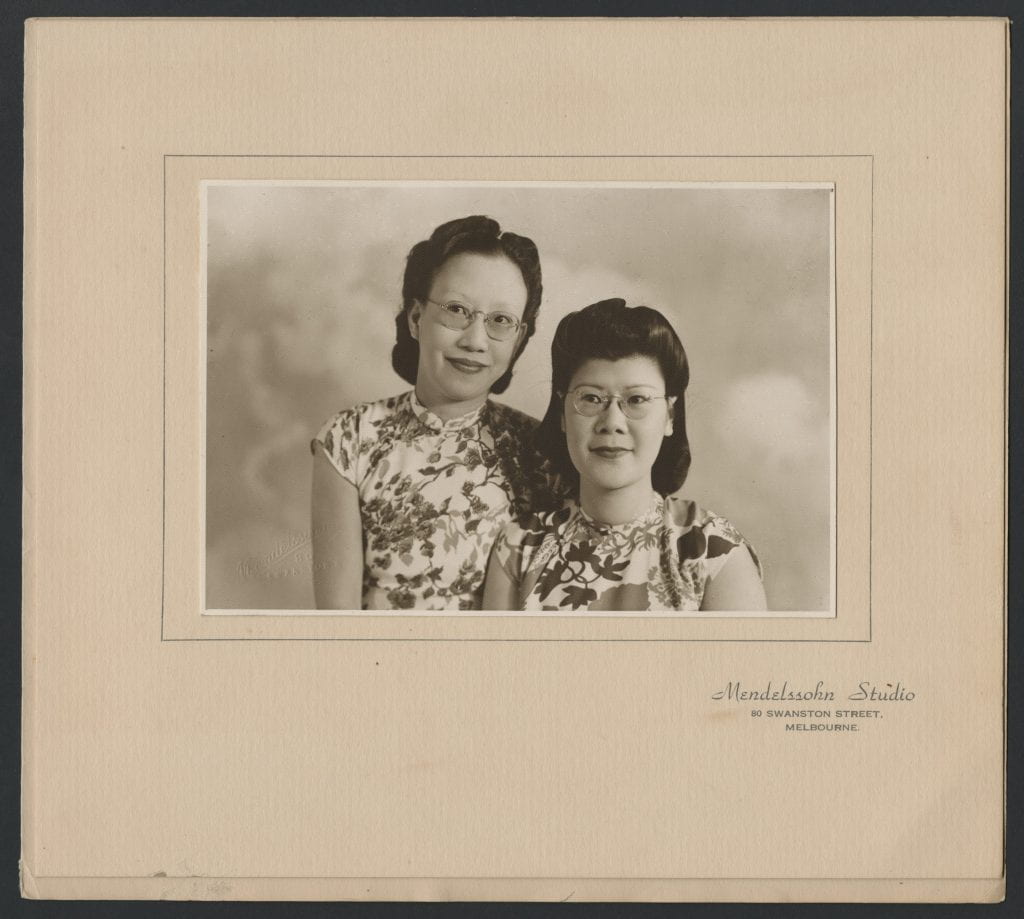
The AIF Malayan Nursing Scholarship
Professor Christina Twomey,
Monash University

Alice Chia and Ooi Soh Im arrived in Australia in 1947, the first recipients of the Australian Imperial Forces (AIF) Malayan Nursing Scholarship. Australian prisoners of war (POWs) from the 8th Division of the AIF devised the scholarship scheme in honour of the assistance given to them during the Second World War by Chinese people in Malaya and Singapore. In 2017, the nursing scholarship is still in operation. We can learn a great deal about the history of the scheme, successful applicants to it and the changing nature of Australia-Asia relationships by examining its records, which form part of the Australian Red Cross Society, National Office Collection at the University of Melbourne Archives.
Australian POWs were keen to honour ethnic Chinese people from Malaya and Singapore with a gesture that would benefit their community as a whole. Members of the 8th Division developed an abiding appreciation of the Chinese community for their support during the battle against Japan, and especially as a consequence of the risks they took to assist POWs during their captivity on Singapore. The scholarship, designed to ‘improve the lot of all Chinese and other Asiatics in Malaya’, would be limited to ‘Chinese and Chinese-Eurasian nurses who could speak English, as the Chinese were the community to whom gratitude was felt’.[1]
Connections with the Red Cross were present from the beginning of the scholarship scheme, with an offer of financial support and its facilities hosting meetings of the Scholarship Board. Although the scholarship was a private initiative of former POWs, their extensive links with government, the military and private charities ensured high-level state support. Former POWs subscribed £11,000 and the Red Cross donated £5000 from the unspent money it had raised within Australia during the war for POWs. In the longer term, the Scholarship Board recognised that the aging population of 8th Division members and former POWs meant that they would be unable to administer their scheme in perpetuity. In 1982 an agreement was made with the Australian Red Cross to take over responsibility for the scholarships.
Once Malaya achieved independence in 1957 and after uniting with Sabah, Sarawak and Singapore in 1963, local health authorities became increasingly wary of participating in a scheme that still bore some colonial overtones. Apart from the restrictive nature of the scheme to ethnic Chinese rather than all Malaysians or Singaporeans regardless of racial background, selection of the nurses remained in the hands of expatriates, rather than Malaysians and Singaporeans themselves. Consequently, by the early 1960s the scheme was in abeyance, for the want of cooperation of local authorities. No longer were the heads of Malaysian and Singaporean medical services expatriate British and Australians; they were university-educated people from the region itself. In 1966, the Malaysian Red Cross wrote to the Scholarship Fund and made clear that: ‘The Malaysian government does not like to support any scheme whereby all benefits are to be conferred on a particular nationality. It prefers that the offer be made to Malaysians irrespective of race.’[2] By 1967, the Australian High Commissioner in Malaysia also refused to sit on the selection committee, in light of the sensitivity in Malaysia and Singapore to the restrictive nature of the scheme.
Participation in the scheme taught the former POWs who administered it about the changing political realities of contemporary Asia. The Melbourne-based Board was ultimately forced to alter its constitution in 1968 to allow nurses of any ethnicity to apply and handed over selection to the local authorities in order to keep its scheme alive. The Malaysian and Singaporean Health Ministries had firm views on appropriate candidates, training courses and postgraduate qualifications. With their cooperation, scholarship nurses were coming to Australia again by the 1970s. Survival of the scheme was given a further fillip in the late 1980s, when the Scholarship Board entered into an agreement with Curtin University of Technology and the Malaysian Ministry of Health.[3]
Initiatives like the AIF Malayan Nursing Scholarship led to ongoing connections with the Asian region, and a need to rethink some assumptions in the light of the colonial logic that had structured them. The former POWs who administered the Scholarship ultimately realised that their own preference for a particular ethnic group could no longer be imposed on the medical profession in independent, multi-racial, nation states. The scholarship attests to the active involvement of war veterans in general, and former POWs in particular, in promoting connections and relationships between Australia and Asia in the post-war period. The ambition to create a ‘novel’ form of war memorial, designed to train ethnic Chinese nurses, ultimately provided an education for the scheme’s administrators about the contemporary realities of a postcolonial region.
For a fuller account of the scholarship, please see Christina Twomey, ‘”A Novel Form of War Memorial”: the AIF Malayan Nursing Scholarship and Australia-Asia Relations’, History Australia, 2017.
[1] ‘History of Establishment of AIF Nursing Scholarship’ in ‘AIF Malayan Nursing Scholarship Minute Book’, AIF MALAYAN MEMORIAL NURSING SCHOLARSHIP (2016.0061). Australian Red Cross Society – National Office, University of Melbourne Archives
[2] AIF MALAYAN MEMORIAL NURSING SCHOLARSHIP (2016.0061). Australian Red Cross Society – National Office, University of Melbourne Archives
[3] D.W. Watts, Vice Chancellor, Curtin University to Sir R. Swartz, Chairman of the AIF Nursing Scholarship Board, 10 June 1987, AIF MALAYAN MEMORIAL NURSING SCHOLARSHIP (2016.0061). Australian Red Cross Society – National Office, University of Melbourne Archives
Categories
I’m here via https://storify.com/perkinsy/ozha2017-keynote2 and *chuckle* pleased to be able to read prose rather than tweets!
This is a most interesting article. I’m not an historian, I’m a book reviewer at ANZ LitLovers but I’m interested in history, especially the little known aspects of it. So thanks to the author for sharing her work here!